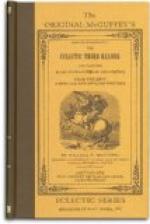7. When he gave her the money, she said, as she dropped a tear of joy, “You are a dear, good boy, Henry. I did not know how I could earn enough to buy bread with, but now I think we can manage to get along quite well,”
8. Henry worked all the day, and went to school in the evening. He earned almost enough to support his mother and his little sister.
LESSON XV.
tread whis’per soft’ly talk cheer ful’ care’ful
DON’T WAKE THE BABY.
[Illustration: Script Exercise:
Baby sleeps, so we must tread
Softly round her little bed,
And be careful that our toys
Don not fall and make a noise.
We must not talk, but whisper low,
Mother wants to work, we know,
That, when father comes to tea,
All may neat and cheerful be.
]
LESSON XVI.
full load heav’y mid’dle heav’i er
slip wrong han’dle broth’er de ceived’
[Illustration: Two boys carrying a basket on a pole between them.]
A kind brother.
1. A boy was once sent from home to take a basket of things to his grandmother.
2. The basket was so full that it was very heavy. So his little brother went with him, to help carry the load.
3. They put a pole under the handle of the basket, and each then took hold of an end of the pole. In this way they could carry the basket very nicely.
4. Now the older boy thought, “My brother Tom does not know about this pole.
5. “If I slip the basket near him, his side will be heavy, and mine light; but if the basket is in the middle of the pole, it will be as heavy for me as it is for him.
6. “Tom does not know this as I do. But I will not do it. It would be wrong, and I will not do what is wrong.”
7. Then he slipped the basket quite near his own end of the pole. His load was now heavier than that of his little brother.
8. Yet he was happy; for he felt that he had done right. Had he deceived his brother, he would not have felt at all happy.
LESSON XVII.
bus’y (biz’zy) mis’chief looked un’to glee
con triv’ing ring’lets nod’dle drew nun
press’ing fin’gers car’pet wise lips
em brace’ pon’der lash’es climb true
MY GOOD-FOR-NOTHING.
1.
“What are you good for, my brave little man?
Answer that question for me, if you can,—
You, with your fingers as white as a nun,—
You, with your ringlets as bright as the sun.
All the day long, with your busy contriving,
Into all mischief and fun you are driving;
See if your wise little noddle can tell
What you are good for. Now ponder it well.”




